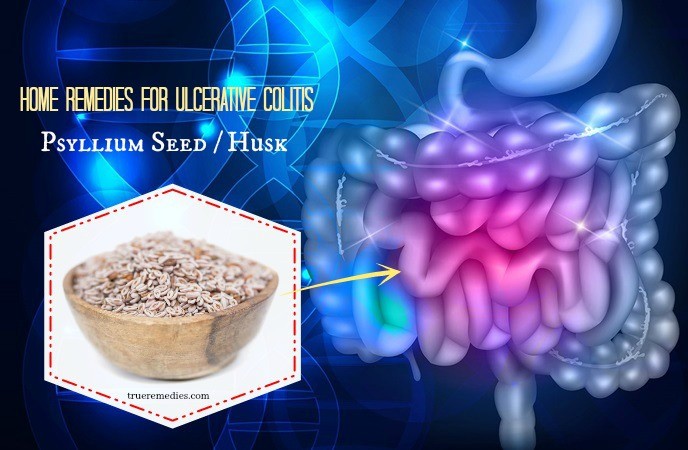Contents
Is there any cure for ulcerative colitis? If you are looking for solutions for ulcerative colitis, then you should not skip this article. Here, we will provide you with natural home remedies for ulcerative colitis symptoms which do not involve with medications or drugs. However, to be honest, natural remedies will not cure the inflammatory bowel disease (IBD), but they could alleviate the flare-ups and inflammation.
Basically, ulcerative colitis is considered the most common type of inflammatory bowel disease. Its symptoms may make mundane everyday activities rather daunting and might impact self-esteem, careers and relationships.
The following parts introduce to you basic information about ulcerative colitis, including what it is, what causes it, what common signs and symptoms are, what risk factors are, etc.
What Is Ulcerative Colitis?
Actually, ulcerative colitis is the inflammatory bowel disease causing long-lasting inflammation along with ulcer symptoms, not to mention the sores in digestive tract. This condition impacts the innermost lining of large intestine and rectum. To put in simple words, it often impacts the rectum and the lower section (sigmoid colon). However, it could impact the whole colon as well. Generally, if the colon is impacted more, the symptoms will become worse.
This condition could happen in people of all ages, yet people before the age of 30 seem to be easily prone to this disease.
Ulcerative colitis could be debilitating and result in life-threatening complications.
TrueRemedies Partner Solutions

Need a Help from the Leading Expert Online, Available 24/7?
They’re all here and ready to answer your questions online or by phone. Keep asking questions until you get the answer you need.
What Causes Ulcerative Colitis?
In fact, experts are not sure about the causes of this condition. However, the culprit may be because of the immune system malfunction which overacts to normal bacteria within the digestive tract. Sometimes, it could be resulted from other types of bacteria and viruses that cause it.
Some experts say that stress and diet were known as the underlying causes of ulcerative colitis, yet recently professionals have said that these factors just aggravate the condition of inflammation, while not causing it, in accordance with Mayo Clinic.
If your family have a history of getting ulcerative colitis, chances are, you will be more likely to suffer from it.
What Are Symptoms Of Ulcerative Colitis?
Usually, ulcerative colitis starts steadily and could be worse over time. The symptoms of this disease could range from mild to severe. The majority of people have periods of remission, which are the times when their symptoms disappear that may last for weeks or even years.
Ulcerative colitis symptoms could widely vary, depending on the location and severity of the inflammation. If you are suffering from ulcerative colitis, you might have some common signs and symptoms below:
- Abdominal pain, cramping
- Diarrhea associated with pus or blood
- Rectal pain and bleeding
- Urgency to release stool
- Weight loss or loss of appetite
- Inability to discharge stool regardless of the urgency
- Inability to grow in children
- Fatigue
- Rapid heart rate
As reported, having ulcerative colitis may result in some serious health issues plus with complications, including:
- Severe dehydration
- Severe bleeding
- Liver disease
- Skin, eye and joint inflammation
- Bone loss
- A hole in the colon
- Swelling colon
- A higher risk of colon cancer
- A high risk of blood clots in arteries and veins
- Sores in the mouth lining
What Are Risk Factors?
As mentioned above, ulcerative colitis often starts the age of 30, yet there are also some cases that people have no sign of this disease until the age of 60.
Also, you will be at a higher risk of developing this condition if you have a close relative suffering from this disease, such as a sibling or parent.
The next risk factor is a specific medication used for treating scarring cystic acne, named isotretinoin, according to the American Journal of Gastroenterology.
Sometimes, stress could trigger a flare-up of ulcerative colitis. Therefore, it is crucial to reduce and even avoid stress, especially chronic type of stress, through stretching, exercising, practicing meditation and breathing exercises.
25 Effective Home Remedies For Ulcerative Colitis Symptoms Removal
Oftentimes, the conventional ulcerative colitis treatment involves either surgery or drug therapy and anti-inflammatory drugs are often the initial step of the treating process. There are two common anti-inflammatory medications which are often prescribed for those people having ulcerative colitis, which are corticosteroid and aminosalicylates. However, these medications also expose you to some side effects. Thus, it is important to look for some natural ways to solve your problem without the use of harmful drugs.
Here, we from TrueRemedies will uncover top natural but effective home remedies for ulcerative colitis symptoms removal that you can easily apply without complicating preparation. Check out below!
1. Turmeric
This is an Indian spice used in curry and also one of must-try home remedies for ulcerative colitis. This is thanks to the curcumin compound which is an antioxidant and has anti-inflammatory properties [1].
A study showed that this phytochemical if combined with mesalamine therapy was superior to placebo in inducing the endoscopic and clinical remission in sufferers of mild-to-moderate ulcerative colitis.
Some ways that turmeric’s pharmacological properties benefit in ulcerative colitis are:
- It modulates the release of some inflammatory agents causing ulcerative colitis.
- It alleviates the symptoms of this condition like mucosal ulceration, and thickening of intestinal walls.
- It has gastroprotective property and immunomodulatory action, improves antioxidant effects, and protects from gastric infections.
There are a few ways to use turmeric as one of home remedies for ulcerative colitis:
Method 1: Fresh turmeric roots
- Take 1-3 grams or ½ inch long piece of turmeric root chopped or sliced.
- Alternatively, you can juice it and add it to other fresh juices with a pinch of black pepper. Have it daily to improve your digestion.
Method 2: Turmeric powder
Choose good quality turmeric powder to reap the benefits of this spice. Consume 1 teaspoon of turmeric powder every day to have good results. Or, you can mix 1-2 grams of turmeric powder with a pinch of black pepper and have it twice per day. Start with small dosages and steadily increase.
Note: Do not take it on an empty stomach.
Method 3: Turmeric tincture
This form of turmeric is very beneficial for inflammation and pain relief.
You just need to take 10-30 drops of turmeric tincture fro 2-3 times per day, basing on your condition’s severity. Or, add it to juices, teas or smoothies for similar effects.
Note: The maximum dosage you should take is from 20 to 30 drops for 3 times per day.
Method 4: Turmeric tea
This is a good option when it comes to using turmeric for ulcerative colitis relief. I is particularly suitable for people who are not willing to make a turmeric paste.
- Take 4 cups of water to boil up
- Add 1 teaspoon of turmeric into
- Reduce the heat and allow it to simmer for 10 minutes or so
- After straining, add lemon juice or ginger for taste (optional)
- Take 1-2 cups per day with a meal
Note: Do not take it on an empty stomach.
Method 5: Turmeric milk
Turmeric milk can ease the symptoms of ulcerative colitis in a delicious way while boosting your immune defenses.
Take the steps here:
- Add ½-1 inch piece of turmeric to a 8 ounces of non-fat milk
- Boil the mixture up
- Strain out the mixture and let it cool down
- Have 1-2 cups per day
Warnings:
- If you are considering taking turmeric supplements, consult your doctor first.
- Turmeric supplements should be avoided if you are using blood thinners or having gall bladder obstructions.
- Also, consult your doctor if you have a bleeding disorder.
- Women who are pregnant and breastfeeding should not use this ingredient.
- Stop using turmeric supplements about 2 weeks before a surgery.
- Turmeric might interact with specific medications such as diabetes, stomach acid-reducing drugs, and blood thinners.
- Limit your intake of turmeric as a spice if you have kidney stones or gout.
2. Gingko Biloba
Gingko biloba is one of the oldest living tree species which has a long history of use in dealing with blood disorders and memory problems. This herb is even good for people with ulcerative colitis. The leaves of gingko contain flavonoids and terpenoids, which are antioxidants. It has been shown to be effective in treating the experimental colitis in rodents. [2] [3] [4]
3. Boswellia
This is a medicinal herb originated from a tree native to India. The resin of the bark has an active ingredient which is believe to possess anti-inflammatory effects. In the extract form, it is popularly used to deal with inflammatory conditions like rheumatoid arthritis.
According to a study, it was found that 82% of people taking 350 mg of a Boswellia extract 3 times per day had remission from mild-to-moderate ulcerative colitis.
In reality, boswellia is available in the pill form. Standardly, it has 60% of boswellia acids.
Note: Boswellia extract should not be used for over 12 weeks if not under the supervision of a doctor.
4. Bromelain
This is a mixture of protein-digesting enzymes originated from pineapple stem. Bromelain is believed to decrease the digestive inflammation. In accordance with a Duke University animal study, it was found that the daily treatment with oral bromelain reduce the risk and severity of colitis.
Taking bromelain extract or dietary supplements is said to be more efficient than consuming the fresh pineapples in reducing inflammation and pain.
The daily dose of bromelain is 3-4 doses of 40mg or about 2 standard-size slices of pineapple. Commercial preparations of bromelain are available in capsule, tablet and liquid form. However, as these products have mostly stem bromelain, the dosing of each is different. The majority of manufacturers recommend taking 500-1000 mg of bromelain each day.
Notes:
- Bromelain might increase heart rate, trigger allergic reactions, and cause diarrhea or vomiting in some people.
- Women taking this substance might experience increased menstrual bleeding.
- People with liver disease, kidney disease, high blood pressure or a bleeding disorder should be cautious when using bromelain.
5. Probiotics
Regarding home remedies for ulcerative colitis, probiotics are believed to be good for managing ulcerative colitis as well as other chronic digestive disorders.
They are considered friendly bacterial agents which can control harmful bacteria whilst decreasing inflammation and boosting the protective mucus lining of the gut. Furthermore, they are reckoned as safe with no side effects.
The University of Alberta study showed that probiotics can restore and maintain a natural microbial flora in the gut. It decrease harmful inflammatory responses and maintains remission [5]. Certainly, probiotics are not a replacement for convention medication, but they could support the treating process significantly.
You can find probiotics in yogurt and kefir. It is also available in capsule form. Actually, there is no regulation of probiotics in the food form. But, you should discuss with your doctor if you are using any complementary remedies.
6. Aloe Vera
Studies have found that aloe vera has an ability of treating mild to moderate cases of ulcerative colitis because of its anti-inflammatory properties [6] [7].
This herbal therapy is widely used to treat IBD. In fact, aloe vera gel can inhibit the production of various inflammatory agents and can provide therapeutic benefits for IBD sufferers.
There is no specific dosage of aloe vera for ulcerative colitis. But, you should take 100ml of aloe vera juice twice per day for about 4 weeks to improve the symptoms of this condition and increase the chances for remission. However, in general, the quantity had better be based on your age as well as condition’s severity.
Notes:
- Topical use of aloe vera gel does not come with side effects.
- If taken internally, people with Crohn’s disease, kidney disease, hemorrhoids,
7. Psyllium Seed / Husk
Psyllium is a plant that contains seeds and husks. Husks are an outer coating of the seeds of psyllium plant. Both the husk and seed powder are important for ulcerative colitis treatment, but husk powder seems to be more important. Psyllium is a rich source of fiber and acts as a sponge and absorbs toxins within the digestive tract. It also helps eliminate toxins when it travels the colon.
Furthermore, this ingredient can enhance your gut motility, lessen constipation symptoms, and improve the eradication of waste.
You can take a mixture of psyllium husk/seed powder every day to reap its benefits for ulcerative colitis. But, use organic psyllium because psyllium tends to be contaminated with pesticides.
What you have to do is:
- Buy organic psyllium husk powder and psyllium seed powder
- Mix them together with the ratio of 1:1
- Add water into and drink it
Note: It is still better to discuss with your doctor whether or not psyllium is appropriate for your own case.
8. Olive Oil
Olive oil is one of the most efficient home remedies for ulcerative colitis, both mild and moderate cases. Having a high content of mono-unsaturated fats, olive oil also possesses immunomodulatory along with anti-inflammatory properties.
Andrew Hart, MD, of the University of East Anglia in Norwich, England has said that consuming large amounts of oleic acid (from 2-3 tablespoons of olive oil) could prevent the risk of ulcerative colitis by half. Oleic acids can dampen down the bowel inflammation by blocking chemicals which stimulate inflammation.
Just simply consume 2-3 tablespoons of extra virgin olive oil every day to take advantage of it for ulcerative colitis relief.
9. Wheat Grass Juice
Wheat grass is biologically referred to as triticum aestivum. This is a young wheat plant and its cotyledons are used to make powders, juices and other supplements.
Wheatgrass has a number of health benefits due to main reviving properties. It is often used to treat nausea, bowel problems, constipation, acidity, high blood pressure, etc. It can promote weight loss, helps detoxify the body and be used for oral care [8] [9].
In regard to treating ulcerative colitis, wheatgrass is touted as a natural food improving symptoms of this condition.
Many studies have been conducted on the usages of wheatgrass juice for relieving ulcerative colitis.
Possibly being an autoimmune disease, wheatgrass is claimed to help patients with ulcerative colitis because it acts as a strong immune modulator.
You can drink 4 teaspoons of wheat grass juice every day, then steadily increase that dosage to 3.5 ounces each day to get the best results.
Note:
- Consult your doctor before using this plant. It is just a complementary treatment, not the alternative for treating ulcerative colitis.
- People with gluten intolerance and allergies to wheat or grass products or having celiac disease have to avoid consuming wheatgrass.
10. Fish Oil
Due to omega-3 fatty acid content plus with anti-inflammatory properties, fish oil can relieve symptoms of active ulcerative colitis. The omega-3 fatty acids are polyunsaturated fatty acids that could decrease inflammation [10].
The researchers in Boston University Medical Center showed that sufferers of gastrointestinal disorders may have abnormal profiles of essential fatty acid. The EPA in fish oil interferes with the synthesis of highly inflammatory leukotriene B4 in the lining of the colon and this impact contributes to the improvement of ulcerative colitis.
Thus, a remedy using fish oil can help with ulcerative colitis relief. You can start by taking 1 gram of fish oil supplement every day, then increase steadily to 2-4 grams.
11. Slippery Elm
Slippery elm bark powder coats and soothes the alimentary canal and digestive track which are inflamed and ulcerated as the result of ulcerative colitis, IBS, Crohn’s disease, and IBD. It is thanks to the mucilage content. Also, it can add bulk to the stool to decrease diarrhea [11].
What you need to do is:
Method 1:
- Mix 1 tablespoon of powdered slippery elm bark with 1 cup of hot water
- Allow it to steep for several minutes
- Have it twice per day
Method 2:
- Mix 1 teaspoon of sugar with the same amount of slippery elm together
- Add them in 2 cups of hot water to create a gruel
- Have it twice per day
12. Calendula
Calendula is a common plant in North America and Europe and has been sued as herbal medicine for centuries. Calendula has anti-inflammatory and soothing properties, which are effective in treating ulcerative colitis. It also improves digestion and boosts the tissue healing.
- Put 1-2 teaspoons of calendula flowers in a cup of hot water
- After allowing it to steep for 15 minutes or so, strain it
- Have this solution 2-3 times per day
13. Fenugreek
Among home remedies for ulcerative colitis, fenugreek is easy to find. This plant forms a defensive coat along digestive tract. Furthermore, it also alleviates inflammation and provides you with nutrition, like vitamin A and C, calcium, iron, protein and other nutrients.
What you need to do is:
- Add 1 teaspoon of crush fenugreek seeds into a cup of hot water
- Allow it to steep for 4-5 minutes
- Have this tea every day till you see good results
14. Ginger
This spice is used for a variety of natural treatments for infections and other related problems. The anti-inflammatory effects, rich source of antioxidants in ginger make it one of the best home remedies for ulcerative colitis symptoms. It can not only remove harsh chemicals within the body while improving the digestive tract. You should not take it in excess, however.
All you have to do is:
- Mix 2 tablespoons of grated ginger with 1 cup of water
- Boil it up and allow it to simmer for 10 minutes
- Add lemon juice and honey for taste (optional)
- Strain the tea and have it
- Do this several times per week to get good results
Or, you can take ginger supplements with the supervision of a doctor.
15. Cabbage Juice
This is a wonderful remedy for ulcerative colitis due to its sufficient content of minerals and nutrients for the inner bowel’s health. At the same time, it also helps reduce inflammation.
- Blend some cabbage in a blender to take its juice
- Drink the juice regularly to reduce the symptoms of ulcerative colitis
16. Buttermilk
Often used for curing ulcerative colitis, buttermilk can also aid in preventing constipation and promoting bowel movement. Furthermore, it reduces the inner inflammation that has impacted the rectum and colon.
You just need to drink buttermilk a few times per day to relieve this condition.
17. Green Tea
In green tea, there is epigallocatechin Gallate (EGCG) which has anti-inflammatory and antioxidants effects, thereby improving cardio-vascular health. Also, it plays an important role in preventing and treating cancer. Moreover, many recent studies have proved that this extract possesses a positive effect on those people with a bowel disease like ulcerative colitis.
A study conducted at the University of Kentucky assessed the effectiveness and safety of an oral dose of green tea polyphenols in sufferers with mild-to-moderate ulcerative colitis. It was shown that the 85% of people involved in the polyphenol group had remission as opposed to the ones in the placebo group.
After all, whether or not you are affected by ulcerative colitis, it might be wise to stock up on the green tea because it offers a host of many health benefits.
18. Chamomile
Chamomile could be beneficial as it can soothe the digestive tract and has anti-inflammatory properties [12]. Chamomile may relieve cramping as well as irritation of the intestines whereas keeping the ulcers from developing and boosting their healing if they have progressed.
You can take the steps here to make use of this herb for ulcerative colitis:
- Add 3 teaspoons of dried chamomile flowers to a cup of hot water
- Let it steep for 10 minutes and strain it
- Have it 3 times per day especially during flare-ups
Note:
- Do not use chamomile on an ongoing basis.
- Avoid it entirely if you allergic to ragweed.
19. Licorice
Drinking licorice root tea is one of the most effective home remedies for ulcerative colitis because it helps soothe the pain associated with this condition. To prepare the tea, you can take the following steps:
- Boil ½ ounce of licorice root in about 2 cups of water
- After 15 minutes of steeping, strain and drink it
You can also find licorice in the form of tablets or extract.
20. Add Omega-3 Fatty Acids To Your Diet
As part of a healthy diet, healthy fats which are found in foods such as fatty fish can keep inflammation under control and relieve ulcerative colitis symptoms.
In fact, omega-3 fats are good for sufferers of both Crohn’s and ulcerative colitis because of strong anti-inflammatory ability. This effect can fuel the cells lining the intestinal tract.
Home Remedies For Ulcerative Colitis – Do’s And Don’ts
Do’s:
- Reduce the consumption of dairy products
- Take protein and vitamin C supplements
- Drink enough water and consume liquids
- Exercise regularly and practice stress-relieving techniques
Don’ts:
- Stop smoking plus with alcohol consumption
- Avoid processed food, carbonated drinks, meat and caffeine
- Avoid eating large meals.
There you have learnt 25 useful home remedies for ulcerative colitis symptoms removal. In addition to these remedies, you need also take some preventative measures and carry out some dietary changes to keep your problem at bay. Besides, it is not necessary to say that you need to consult your doctor once the symptoms get worse.
For further similar tips and tricks about health and beauty, feel free to visit our Home Remedies page.
Leave your comments below this post to let us know what you think about this topic and our methods. We appreciate and will respond as soon as possible.












